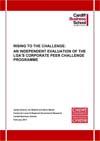The Centre for Local and Regional Government at Cardiff University carried out an independent evaluation of our Corporate Peer Challenge programme to help assess its effectiveness, impact and value for money.
The report ‘Rising to the Challenge: An Independent Evaluation of the LGA’s Corporate Peer Challenge Programme’ concludes that:
Effectiveness: Corporate Peer Challenge is an effective tool at the heart of the Sector-Led Improvement (SLI) programme. The ability for councils to choose the timing of their peer challenge continues to be an important feature. So too does the focus on the five core components of priority setting, leadership, governance, finance and capacity. The quality of the peer team is key, and we need to remain focussed on peer recruitment and continue to strengthen training for peers. The feedback processes during a Corporate Peer Challenge, including the final report, all have value. It is important to make sure reports continue to be written constructively to inform and support improvement, while also providing sufficient information to enable councillors and the public to hold the council to account. There is also a need to consider how follow-up visits are applied, ensuring a focus on delivering them in the councils that will most benefit from them.
Impact: Corporate Peer Challenge is having a positive impact for participating councils and the sector as a whole. The extent of that impact is determined by how councils approach and react to a peer challenge. These impacts tend to occur in five main areas, all of which are all helpful in ensuring councils are best placed to meet the challenges they face. Corporate Peer Challenges have helped provide reassurance; improve external reputation; prompt behaviour change; informed organisational change; and supported service transformation and financial sustainability. For many councils, what happens after the Corporate Peer Challenge is as important as the peer challenge itself. The process can be a trigger for a set of activities and support from the LGA that have had further impact on improvement. We need to promote Corporate Peer Challenge more by using ‘impact stories’ from those who have had one to show how the process helps councils to improve and to encourage all councils to have one.
Value for Money: The Corporate Peer Challenge programme provides value for money. Peer Challenge is a good example of the sector helping itself by providing improvement support at a lower cost than is available through external consultancy. Not only is it cheaper, there is considerable added benefits from it being peer-led. While there are costs to the LGA in managing peer challenges and officer time is needed by councils receiving them, the value of Corporate Peer Challenge should not simply be evaluated on a unit cost basis. There are a range of benefits that offer a return on the cost and investment. Councils benefit in several ways from being involved in a process of peer learning. Peers gain new insights on how other councils operate and have the opportunity of bringing back learning to their own organisation in ways that both improve service outcomes and drive efficiency. Corporate Peer Challenge is a catalyst for a range of activity and support (both formal and informal) which is valuable but difficult to put a price on. Additionally, these mechanisms can act in consort to help prevent failure and the more significant financial costs of intervention.
The report provides a range of recommendations for the further improvement and development of the Corporate Peer Challenge. These were considered by the LGA Improvement and Innovation Board on 8 March 2017 and will inform the continued development of the Corporate Peer Challenge process.

- Published by:
-
Centre for Local & Regional Government Research, Cardiff Business School
- Reference code:
